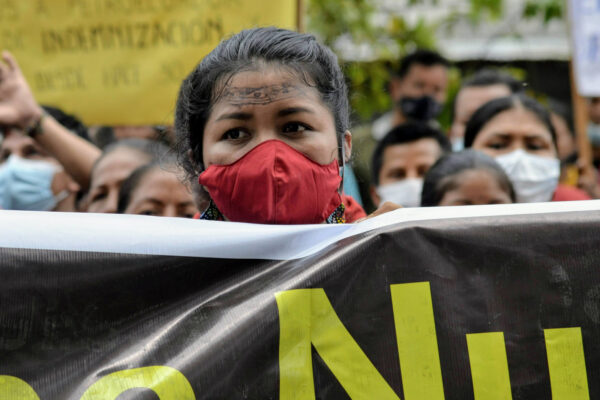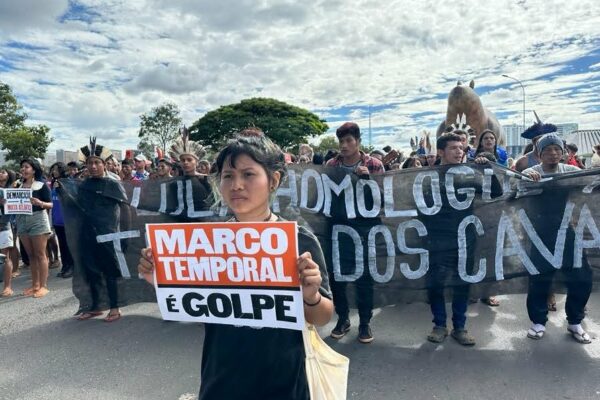Washington – The World Bank has quietly communicated deep concern to the managers and lenders of a major pipeline project that independent environmental groups have said threatens unique ecosystems in the Ecuadorean highlands.
In a letter to the head of the Oleoducto de Crudo Pesado (OCP, or Crude Oil Pipeline) project dated Dec. 19, the Bank’s top environmental official, Ian Johnson, warned that the pipeline, “if constructed or operated in an inadequate manner, would pose serious environmental risks” to areas managed by a World Bank- supported biodiversity conservation project.
Johnson also objected to statements by the OCP and Westdeutsche Landesbank (WestLB), which leads a consortium of banks providing $900 million in project financing, that the effort complies with the World Bank’s environmental and related standards.
“While we welcome such widespread acceptance and use of our standards,” he wrote, “we do not, as a matter of institutional policy, certify compliance or non-compliance in projects that we do not finance or otherwise assist, including the OCP pipeline.” Johnson concluded: “We would like to recommend that OCP provide specific, independent verification of compliance with World Bank standards or, alternatively, refrain from claiming any such compliance.” A copy of the letter was obtained by IPS from Amazon Watch, a California-based group, which has led an international campaign against the project. “The letter is authentic,” according to a World Bank spokesperson.
Its disclosure comes at a critical moment in the OCP’s implementation. On Jan. 14, a parliamentary committee of the German state of North Rhine Westphalen (NRW) is scheduled to hold a hearing about the project and WestLB’s role in it.
The OCP has been the focus of increasing controversy in the state government, which holds a 43 percent interest in WestLB. The state’s environment minister, Baerbel Hoehn, and the state’s Green Party have denounced WestLB’s participation in the project.
Meanwhile, OCP construction and road-building crews have reached the border of the Mindo Namibillo Cloudforest Reserve, one of the world’s most pristine bird sanctuaries. Dozens of local residents, students, and environmental activists have been gathering there over the past week to stage civil-disobedience actions to prevent the crews from entering the reserve.
While such protests have taken place sporadically in the region since September in order to slow the advance of the project, tension has increased significantly in recent days, according to Amazon Watch and local sources.
Published reports from Ecuador on Jan. 9 said the OCP had decided to suspend construction work in the reserve until the end of the rainy season in April but this has not been confirmed. Activists have suggested that the reports were an effort by OCP to calm the situation in advance of the Jan. 14 German hearing.
“It is obvious that the OCP consortium did not want bulldozers battling tree-sitters at the very moment when the company’s $900 million loan is in jeopardy in Germany,” said Yvonne Ramos of Accion Ecologica, an Ecuador-based environmental group. “This is a significant factor in OCP’s announcement that construction is being suspended in the Mindo.” The proposed pipeline – which will stretch some 500 kms from the Ecuadorean Amazon to the Pacific Ocean, passing through several indigenous territories and ecologically fragile protected areas – – has provoked controversy virtually from its conception.
The government of President Gustavo Noboa has defended it as vital for Ecuador’s troubled economy, as it would double the country’s exports of oil, Ecuador’s biggest foreign-exchange earner by far.
Local and international environmental groups and indigenous communities, however, have argued that construction of the pipeline likely would draw settlers, who might clash with indigenous groups and exert unsustainable pressure on fragile rainforest ecologies. Pipeline spills, they have added, could destroy potential eco-tourism spots.
In his letter to OCP Executive President Hernan Lara, Johnson, who is the Bank’s vice president in charge of environmentally and socially sustainable development, appeared to side with the activist group.
“The World Bank recognizes that the OCP pipeline is an important project for Ecuador’s economy and its people; at the same time, we believe that this major infrastructure project can and should be carried out in a manner which fully reflects the environmental sensitivity of portions of the pipeline route, rigorously minimizes adverse environmental or social impacts, and works constructively with local stakeholders to address legitimate issues,” he noted.
The Bank, he went on, was particularly concerned about the impact of the OCP on its Choco-Andean Corridor Project to conserve biodiversity in northwestern Ecuador. The project is co-sponsored by the Global Environment Facility (GEF) and managed by an Ecuadorean environmental group, Fundacion Maquipucuna.
“Based on the information provided by our own staff and by Fundacion Maquipucuna, the OCP pipeline, if constructed or operated in an inadequate manner, would pose serious environmental risks to an important portion of the Choco-Andean Corridor,” according to Johnson, who cited the direct loss of some habitats along the pipeline’s right-of-way, the loss or degradation of other habitats caused by the greater access to the region and by possible oil spills.
The Bank, wrote Johnson, encourages project sponsors to ensure that the effort uses the best technology and practices, including the monitoring of its implementation by independent environmental monitors, and to give “favorable consideration to proposals (by Fundacion Maquipucuna or other qualified organizations) for ecological compensation projects and other conservation-related initiatives.” In a Dec. 14 statement – just five days before Johnson’s letter was sent – WestLB said OCP sponsors in Ecuador had signed contracts “to the effect that strict environmental standards – also of the World Bank – would be observed” in the project’s implementation and that subsequently four consultants approved the project.
“WestLB takes seriously the currently expressed concerns about the environmental compatibility of the project and continues to view it as a precondition that the project sponsors carry out the project in accordance with the agreed environmental standards,” WestLB said.
In November, an 11-page report commissioned by Amazon Watch and written by a former representative of the World Wildlife Fund in Bolivia found that the project’s design and implementation violated at least seven World Bank environmental and social policies.
Chief foreign investors in the OCP include Canada’s Alberta Energy, Spain’s Repsol-YPF, and U.S. companies Occidental Petroleum and Kerr-McGee.













